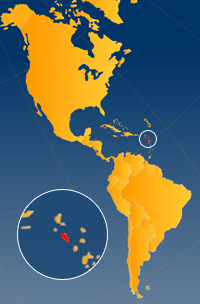- English
- Español
Department of Electoral Cooperation and Observation
Electoral Observation Mission in Saint Kitts and Nevis -
Federal Elections (January 25, 2010)

The Assistant Secretary General of the Organization of American States (OAS), Albert R. Ramdin, and the Permanent Representative of Saint Kitts and Nevis to the Organization, Izben C. Williams, today signed the Agreement on Privilege and Immunities for the observers that will form part of the Electoral Observation Mission of the OAS to the federal elections to be held in the Caribbean country on January 25.
The head of the Electoral Observation Department of the OAS, Steven Griner, will lead the mission, as he has, in recent times, led OAS missions to Saint Vincent and the Grenadines, and to Dominica. The OAS mission will be made up of 12 people who will cover the 94 electoral seats in the 11 electoral districts that divide the country, eight in Saint Kitts and three in Nevis.
“We are very satisfied because Saint Kitts and Nevis requested the observation of the OAS,” Ambassador Ramdin stated. “We hope that the elections are orderly, peaceful, and organized in such a way that can surpass international scrutiny,” he added. “I wish the people of Saint Kitts and Nevis all the best in taking part of this democratic process.”
Ambassador Williams said Saint Kitts and Nevis “is very thankful for the participation of the OAS” in the electoral process. “We will do everything we can to give you an opportunity to observe how we proceed in a democratically and orderly manner. My government is, of course, a strong promoter not only of the democratic process but also of the institutions that speak to this process in a transparent manner and in a way that represents the interests of the people of the country.”
The agreement signed today between the General Secretariat of the OAS and the government of Saint Kitts and Nevis is the first habitual step toward guaranteeing that the Electoral Observation Mission can conduct its work appropriately. The Procedure Agreement, to be signed in the near future, will define with further details the access and basic rules of the observers’ visit.

